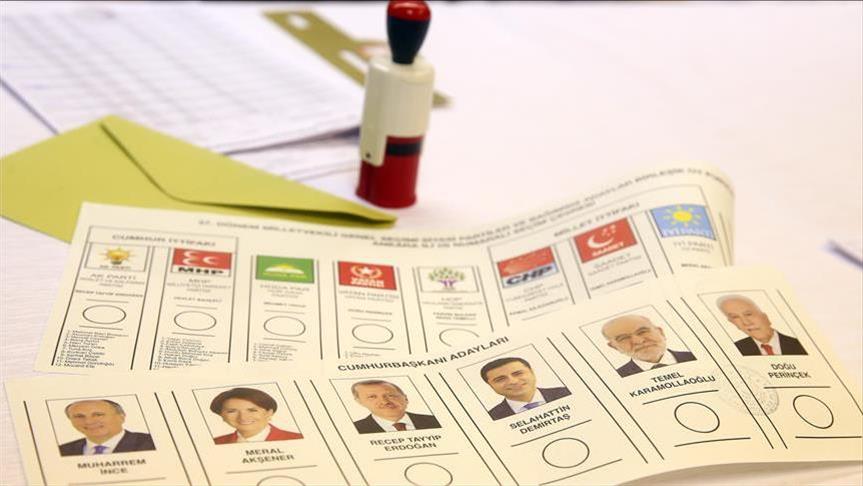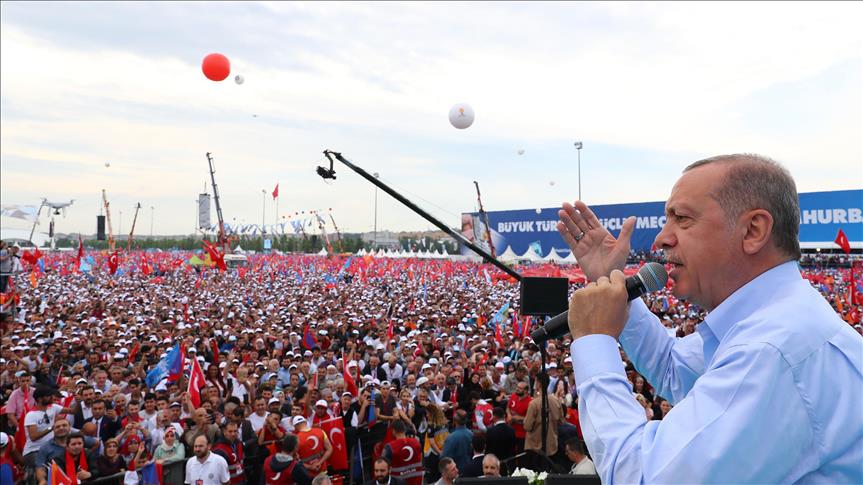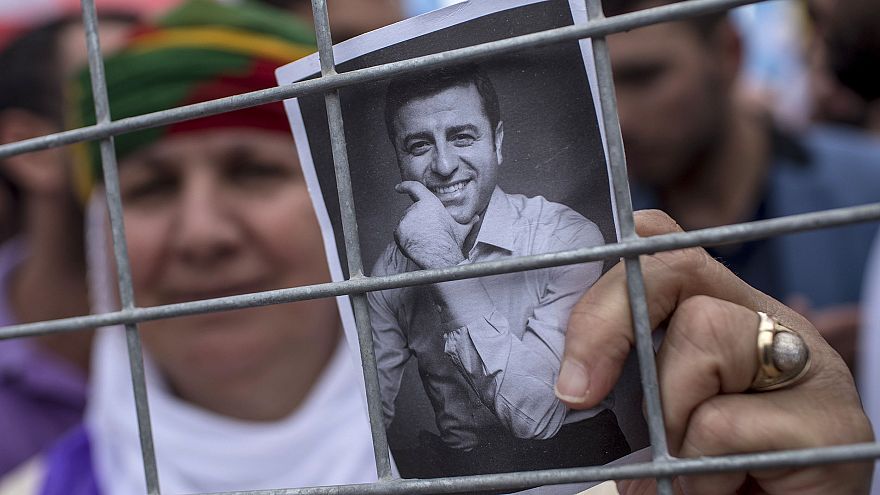New era of hope or a stronger dictator? Turkey goes to polling station to determine future
 09:30, 24 June 2018
09:30, 24 June 2018YEREVAN, JUNE 24, ARMENPRESS. Turkish citizens are heading to polling stations for the historic general elections. Voters are casting ballots to elect both a president and a parliament.
Originally due on 3 November 2019, incumbent President Recep Tayyip Erdogan called for snap elections and is seeking to remain in office, but this time with a lot more powers as the constitution has beefed-up the president’s authorities. These include: Directly appointing top public officials, including ministers and vice-presidents, the power to intervene in the country's legal system, the power to impose a state of emergency.
In addition to those changes, the job of prime minister will be scrapped.
The country is set to transition from a parliamentary system to a full presidential system as result of this elections. The elections will determine whether the growing opposition will eventually be able to win over the ruling AKP party, which has been in power since 2002.
Eight parties are running for parliament. The ruling party, the AKP – Justice and Development - is running in an alliance – People’s Alliance - together with the MHP – the Nationalist Movement Party.
Three opposition parties – the CHP – Republican People’s Party – the SP – Felicity Party – the IYI – Iyi Party – have formed the Nation Alliance.
The three other opposition parties – HUDAPAR – Free Cause Party – VP – Patriotic Party and HDP – Peoples’ Democratic Party – are running separately.
Six candidates are running for presidency, incumbent President Recep Tayyip Erdogan from the AKP, Muharrem İnce from CHP, Meral Aksener from IYI, Selahattin Demirtas from HDP, Temel Karamollaoğlu from SP and Dogu Perincek from Vatan.

Ethnic Kurds, who amount for over 15% of the Turkish population, are expected to be the most determining factor in the outcome of the election. If the Kurds cast their ballots for the HDP and it overcomes the 10% threshold, then the party will have at least 80 seats in the country’s parliament, which under the new constitution will have 600 seats, from the previous 550.
This will allow the HDP to join forces with other parties in the parliament, thus forming an opposition majority. But if Erdogan’s party again turns out to be majority in parliament, then it will have a green light to pass all desirable bills without any obstruction.
It’s no coincidence that Erdogan’s regime jailed many HDP lawmakers, mayors and simply party members in the past months, accusing them in corruption-related crimes, namely in carrying out propaganda of terror. Among the jailed MPs is Selahattin Demirtas from the HDP. Demirtas previously ran for the presidency too, coming in third with over 9% in 2014.
It is noteworthy that in several previous elections the HDP and the ruling AKP were garnering the most votes in the mostly-Kurdish populated eastern regions of Turkey.
The fact that Erdogan has concerns in garnering votes of the Kurds was proved when a secret recording of the president was leaked online, showing how he was instructing his fellow party members to “carry out special work” with everyone in polling stations regarding HDP. The video also showed Erdogan calling on his party members to have dominance in ballot counting commissions, adding that they “can’t repeat June 7” – referring to the 2015 parliamentary elections when for the first time his party lost majority in parliament and failed to form a government, which led to new elections.
Experts believe that secular voters may vote for the HDP, considering that Erdogan has been leading the country down the Islamization path in recent years. Etyen Mahçupyan, senior advisor to Prime Minister Ahmet Davutoglu (2014-2015), said in an interview to Al-Jazeera that secular voters are likely to vote for the HDP in order for the AKP to lose majority in parliament. “I’m not talking about great numbers of course. In June 2015 the HDP was able to garner 1,5-2% from the country’s western regions. The main factor which will be decisive in being elected to parliament continues being the vote of the Kurdish-populated regions,” he said.
Erdogan has to garner more than 50% of the vote today in order to retain the presidency, otherwise he will be forced into a second round, which could lessen his victory and mandate, or even end in defeat. Two candidates having the most votes in the first round will be eligible to run in the second round, and opposition candidates have already announced that they will endorse Erdogan’s opponent, whoever it is, in the second phase.

Erdogan's main rival, Muharrem Ince of the Republican People's Party (CHP), is staunchly secular and a fierce critic of Erdogan. Ince has performed well in the campaign, and could be a real threat in any run-off, according to many experts.
For the first time in history a candidate is running for the presidency from prison. Selahattin Demirtas, once dubbed the Obama of Kurds because of his charisma and popularity, had his pre-election campaign from inside of a 12 sq.m. prison cell. Demirtas is facing up to 143 years imprisonment if found guilty on all charges, including terror related accusations.

Some view these elections to be the last true hope to restore democracy, but some are certain that the process will be full of electoral fraud and corruption. Candidates voiced their concerns regarding unequal conditions numerously during the campaigning, which took place in times of state of emergency. In particular, candidates claim that local television and newspapers have mostly been covering only Erdogan and his party.
Aydin Engin, a columnist for Turkey’s leading newspaper – Cumhuriyet – has said : “Erdogan has bought the entire news media and now the media is working as if it is the organ of the AKP”.
No matter what happens, the result will be important for Turkey's future.
If Erdogan wins the presidency and his party keeps its majority, he will have successfully consolidated his political power.
If both elections go against him, Turkey's political landscape will be dramatically changed.
But if the presidency goes one way and the parliament another, it could signal a period of political instability for Turkey in the years ahead
Turkish voters living abroad - about three million of the 59 million voters in total - have already cast their votes.
By Araks Kasyan
Edited and translated by Stepan Kocharyan




















